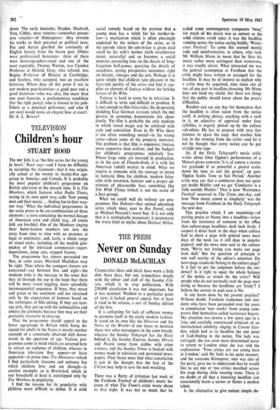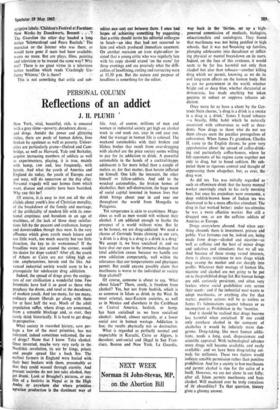Never on Sunday
THE PRESS DONALD McLACHLAN
Cooperative ideas and ideals have worn a little dim these days, but one sympathises deeply with the editor and staff of the Sunday Citi- zen, which is to stop publication. With 230,000 circulation it was not important, but it was national. Wedded to a particular point of view, it lacked general appeal, but at least it tried to be serious, a sort of Sunday edition of the Sun.
It is collapsing for lack of sufficient money to promote itself in the costly modern fashion. It stood on its own like the Observer and the News of the World—if one dares to mention those two solus newspapers in the same breath; whereas the Sunday Telegraph has the Daily behind it, the Sunday Express, Sunday Mirror and People come from stables with other winners, and the Sunday Times is backed with money made in television and provincial news- papers. Fleet Street must find what consolation it can in the thought that the fate of the Citizen may help to save the next weakling.
There was a flurry of irritation last week at the Farnham Festival of children's music be- cause of what The Times critic wrote about its first night. It was not so much that he called some contemporary composers 'twee,' for much of the music was as untwee as the solid citizens could take; it was the headline running across the notice saying baldly, `Water- cress FestivaL' To some this seemed merely rude and uninformative; to others, who took Mr William Mann to mean that he likes his music rather more astringent than watercress, it was cruelly clever. What interested me was the general assumption at Farnham that the critic might have written or arranged for the headline. It may be of interest to explain why a critic may be acquitted, nine times out of ten, of any part in headline choosing. Mr Mann does not need my shield, but there are things that the public should know about the press's difficulties.
Readers can see any day for themselves that the headline is often taken from the notice itself. A striking phrase, anything with a verb in it, an adjective of appraisal under four syllables, is eagerly picked up by the culture sub-editor. He has to prepare with very few minutes to spare the copy that reaches him late in the evening from the critic—and let it not be thought that every notice can be put straight into type.
So, if the Daily Telegraph's music critic writes about John Ogdon's performance of a Mozart piano concerto `it is of course a matter for gratitude if so powerful a pianist scales down his tone to suit the period,' up goes 'Ogdon Scales Tone to Suit Period.' Another critic may say that a conductor does not quite get inside Mahler and we get 'Conductor is a little outside Mahler.' That is how 'Watercress Festival' occurred in The Times one day, and how `New music aimed at simplicity' was the message from Farnham in the Daily Telegraph the next day.
This practice which I am examining—of putting praise or blame into a headline—arises from the insistence of someone in the office that culture-page headlines shall look lively. I suspect it dates back to the days when culture had to share a page with general news most days of the week (as it still does in popular papers); and the news men said to the culture man, 'We're not letting you make our page look dull.' But the question of principle is one well worthy of the editor's attention. Do news-page standards belong to the culture page? Is it fair to put the judgment before the evi- dence? Is it right to upset the whole balance of the notice as struck by the critic? Will people who do not normally read' the page start doing so because the headlines are `lively'? I believe the answer in each case is No.
Is any harm done by the present practice? Without doubt. Farnham tradesmen and resi- dents who have been persuaded over the years to commission 'new works' from young com- posers find themselves called watercress buyers. My attention was drawn a few years ago to a long and carefully constructed criticism of an international celebrity singing at Covent Gar- den, which had as its headline the one piece of fault-finding in the notice. The lady was outraged; she was even more determined never to return to London when she was told the explanation. 'Your critics are too young here in,London,' said Mr Solti in his quiet manner; and the awesome Klemperer, who was also of the party, gave me to understand that he would like to see one or two critics marched across the stage during Aida wearing irons. There is no doubt at all that a knocking headline can occasionally harm a career or flatter a modest talent.
Is the alternative to give notices'simple de-
scriptive labels:-'Children's Festival at Farnham: New Works • by Danckwerts, Bennett . . .'? The Guardian the other day headed a long notice SchWarzkopf and Pears Recitals.' The musician or the listener who was there, or would have gone if seats had been available, wants no more. But are plays, films, painting and television to be treated the same way? Why not? There is no great virtue in a television notice headline which reads 'Crushingly Un- funny Whimsy.' Or is there?
This is not something that critic and sub-
editoriaao.sort out between. them. I once had. hopes of achieving something by suggesting that a. critic should invite his editorial colleague to lunch—an idea that had not occurred to him and which produced immediate easement. On another occasion an irate night-editor in- sisted that a young critic who was regularly late with his copy should attend 'on the stone' for three evenings and see precisely what the diffi- culties of headlining, cutting and correcting were at 11.30 p.m. But the nature and purpose of headlines is something for the editor.



































 Previous page
Previous page